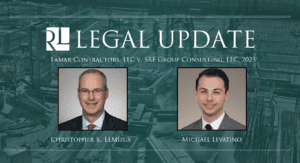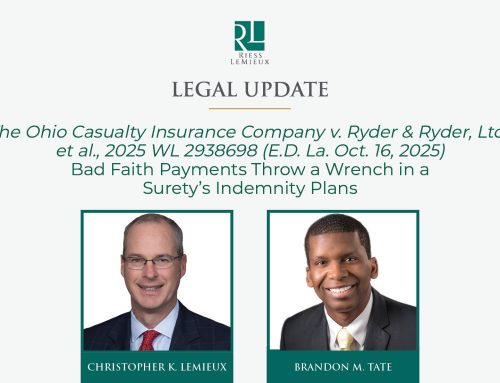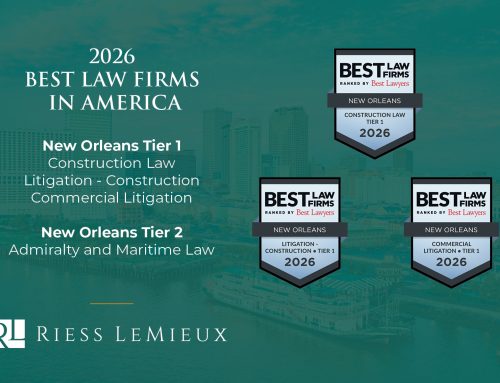
Lamar Contractors, LLC v. SRF Group Consulting, LLC, 2023 WL 1426836 (La. App. 5 Cir. 2/1/23)
The Fifth Circuit Court of Appeal’s Troubling Interpretation of the Public Works Act and Peremptive Periods Could Expose Sureties to Limitless Liability.
Authors: Christopher K. LeMieux and Michael Levatino
The Louisiana Fifth Circuit Court of Appeal recently issued a ruling, contrary to previously settled interpretation of statutory law, that will drastically affect the running of the five-year peremptive period found in La. R.S. 38:2189. In Lamar Contractors, LLC v. SRF Group Consulting, LLC, the Fifth Circuit Court of Appeal addressed the three conditions to initiating the five-year peremptive period, i.e., substantial completion, acceptance of work, or default. Under the third condition, the Court found that the peremptive period does not begin unless the contractor is placed in default under the terms of the bond, which could prevent the peremptive period from beginning to run, and potentially expose sureties to indefinite liability.
In this case, the lawsuit arose out of a public recreation building owned by St. James Parish The Parish entered into a contract with Lamar Contractors, LLC to serve as the general contractor and to build a building designed by SRF Group Consulting, LLC Travelers Casualty and Surety Company of America provided a performance bond naming the Parish as the obligee and Lamar as the principal. A dispute arose regarding the design and specifications and Lamar stopped work. Subsequently, Lamar filed a notice of termination on July 15, 2015. Lamar subsequently filed suit. The Parish filed a Reconventional Demand alleging Lamar had performed defective work and breached the general contract in unilaterally deciding to stop work. Subsequently, the Parish amended its Reconventional Demand naming Travelers. Travelers then filed an Exception of Peremption arguing the Parish’s claims against it were untimely under La. R.S. 38:2189 as they were brought more than five years after Lamar had allegedly been placed in default. The trial court granted the Exception.
The Parish appealed the trial court’s decision arguing the trial court misapplied 38:2189. La. R.S. 38:2189 states an action on a bond “. . .shall prescribe 5 years from the substantial completion, as defined in 38:2241.1, or acceptance of such work, whichever occurs first, or of notice of default of the contractor. . ..” Travelers argued on appeal that the Parish’s claims against it were perempted based on the third condition listed as a prerequisite to action against the surety, i.e., notice of default of the contractor. Travelers argued that Lamar was given notice of default when the Parish filed its Reconventional Demand on January 9, 2016. The Parish’s claim against Travelers was not asserted until June 18, 2021, over five years later. However, the Parish argued the five-year time limitation never began to run because it had never provided formal notice of default.
The Court reviewed the three triggers of perempetion under 38:2189. The Court found that the Public Works Act provides no definition of default and/or requirement for the form of notice of default. Further, there was no evidence on the record that indicated that the Parish considered Lamar to be in default. Since the Public Works Act does not define default, the Court then turned to the Travelers performance bond. Section 14.3 of the Bond defines default “as the failure of the contractor which has not been remedied or waived, to perform or to otherwise comply with a material term of the construction contract.” The Court noted that Lamar terminated the contract and the condition (i.e. termination) had not been remedied and the Parish had not waived its rights against Lamar. The Court also stated that by extension the Parish had not waived Travelers obligations to a remedy guaranteed by the bond. Thus, the court found that the contractor’s acts met the definition of default in the bond.
However, he Court then looked ot whether the Parish followed all the requirements in the bond to actually place Lamar in default. Section 3 of the Bond stated that the Parish needed to (i) provide notice to both Lamar and Travelers that it is considering declaring a contractor default to give Travelers opportunity to discuss possible terms of settlement; (ii) Parish is required to declare a contractor default, terminate the contract and notify the surety; and (iii) pay the balance of the Contract Price either to Travelers or to a contractor selected to perform the construction contract. The Court found the Parish had not complied with the bond’s requirements to place Lamar in default. The Court further found that since the Bond had a very specific procedure for placing Lamar in default and triggering Travelers’ obligations, and that procedure was not followed. The Court held the simple allegation of a breach of contract in the Parish’s Reconventional Demand was, therefore, insufficient to start the five-year peremptive period under 38:2189 as to “default”.
Moreover, the Court addressed the public policy concerns related to indeterminate exposure to liability simply stating, without further reasoning or support, that the decision will not expose Travelers to liability on the performance bond for an indeterminate amount of time. However, it appears that is exactly what their ruling did when it held that the five-year peremptive period never began to run in this case.
The Fifth Circuit Court of Appeal’s ruling drastically changed the interpretation of La. R.S. 38:2189 and the implication of the peremptive period for public construction contracts. Contrary to the Courts assertion that its ruling would not expose sureties to indeterminate liability, the Court’s finding that the third condition of default can stand on its own for initiating the peremptive period under La. R.S. 38:2189 will expose sureties to indeterminate liability. Absent an appeal to the Supreme Court and overruling by same, the legislature will need to act to remedy the Courts interpretation of the Public Works Act and the five-year peremptive period.



